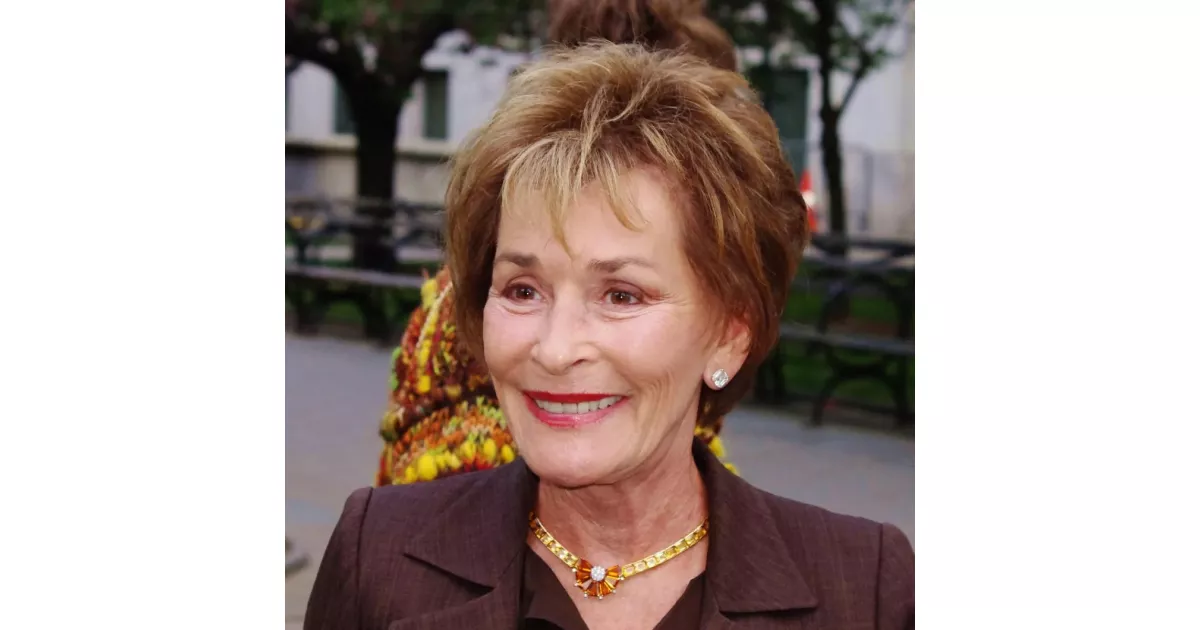"Judge Judy" was a long-running reality court show featuring Judge Judith Sheindlin presiding over real-life small-claims disputes. Participants agreed to binding arbitration, making Sheindlin's rulings final. The show aired in syndication and was highly successful, continuing to draw strong ratings in reruns distributed by CBS Media Ventures.
October 21, 1942: Judy Sheindlin is Born
Judy Sheindlin was born on October 21, 1942, in Brooklyn, New York, to Murray and Ethel Blum, a couple of German-Jewish descent.
November 29, 1957: Petri Adonis Byrd is Born
Petri Adonis Byrd, later known as Officer Byrd on Judge Judy, was born on November 29, 1957. He was born in the Crown Heights neighborhood of Brooklyn, New York, and would eventually change his middle name to "Hawkins" in honor of his late mother.
1981: Joseph Wapner's Tenure on "The People's Court" Begins
Joseph Wapner presided over "The People's Court" from 1981 to 1993.
February 1993: Los Angeles Times Article Spotlights Sheindlin
In February 1993, the Los Angeles Times published an article about Sheindlin's tough reputation as a family court judge, written by Josh Getlin, which played a pivotal role in launching her television career.
May 21, 1993: Joseph Wapner Exits "The People's Court"
On May 21, 1993, Joseph Wapner was released from "The People's Court," prompting Sheindlin to offer her services for the show.
October 24, 1993: Sheindlin Featured on "60 Minutes"
Following a Los Angeles Times article highlighting her tough reputation, Sheindlin appeared on "60 Minutes" on October 24, 1993, gaining national recognition.
1993: Judge Judy Featured on 60 Minutes
In 1993, Judge Judy Sheindlin was featured on the renowned news magazine program "60 Minutes." The segment provided viewers with an inside look into her no-nonsense approach to justice and her rising popularity as a television judge. Clips from this interview would later be included in her 2014 primetime special, "Judge Judy Primetime."
1993: "The People's Court" Cancellation
In 1993, the first 12-season incarnation of the court show "The People's Court" was canceled due to low ratings.
1993: Getlin Publishes Retrospective Article on Sheindlin
In honor of "Judge Judy's" final season, Josh Getlin wrote a follow-up article for the Los Angeles Times, published on June 8, 2021, reflecting on his 1993 article that significantly contributed to Sheindlin's television career.
1993: Joseph Wapner's Tenure on "The People's Court" Ends
Joseph Wapner presided over "The People's Court" from 1981 to 1993.
March 1995: Sheindlin Approached for Courtroom Series
In March 1995, talent scouts Kaye Switzer and Sandi Spreckman proposed the idea of Sheindlin presiding over her own courtroom series, leading to the development of "Judge Judy."
1995: Initial Contract Signed Between CBS and Rebel Entertainment
In 1995, CBS and Rebel Entertainment entered into a contract where Rebel would receive 5% of the gross proceeds from Judge Judy, setting the stage for a long-running legal dispute over profit-sharing.
February 7, 1996: "Don't Pee On My Leg and Tell Me It's Raining" Published
Sheindlin's first book, "Don't Pee On My Leg and Tell Me It's Raining," was published on February 7, 1996, achieving significant sales despite the controversial title.
September 1996: Judge Judy Premieres with Modest Ratings
Judge Judy premiered in September 1996 with minimal media attention and publicity. Initially, the show garnered average ratings, placing it in the middle of the pack among the numerous syndicated programs airing at the time.
September 16, 1996: "Judge Judy" Premieres
On September 16, 1996, the court show "Judge Judy" premiered, marking the beginning of its successful run.
1996: N/A
N/A
1996: Distinct Presentation Style of Early "Judge Judy" Episodes
Season 1 of "Judge Judy," particularly its initial episodes, had a distinct presentation compared to later seasons, featuring a different courtroom set, stage props, and theme music composed by Fred Lapides.
1997: Judge Judy's Ratings Improve in Season 2
By the second season of Judge Judy in 1997, the show had gained significant momentum, experiencing a surge in ratings.
1997: Revival of "The People's Court" Premieres
Capitalizing on the success of court-themed shows like "Judge Judy," a revival of the popular courtroom series "The People's Court" debuted in the fall of 1997. This demonstrated the growing popularity of the genre.
1998: Judge Judy Becomes Highest-Rated Daytime Program
During its third season (1998-1999), Judge Judy achieved a groundbreaking milestone by becoming the highest-rated program in daytime television. Its ratings more than doubled compared to the previous season, surpassing even established powerhouses like "The Jerry Springer Show" and "The Oprah Winfrey Show." This marked the show's rapid ascent to the top of daytime television.
1998: Judge Judy Appears in CHiPs '99 Film
In 1998, Judge Judy made a cameo appearance as herself in the made-for-television crime drama film "CHiPs '99." The plot involved Officer Ponch (Erik Estrada) convincing Captain Baker (Larry Wilcox) to appear on Judge Judy's courtroom program. Baker hesitantly agrees and ends up suing a character named Nyeman (Googy Gress) for inadequate dog-walking etiquette after an alleged incident on his property.
1998: N/A
N/A
1999: Pre-1999 "Divorce Court" Format
Before 1999, the court show "Divorce Court" used a scripted format based on court transcripts of past proceedings.
1999: Judge Judy Adopts Non-Negotiable Salary Strategy
By 1999, Judge Judy's soaring popularity translated into significant salary increases. Recognizing her value and leverage, she implemented a unique negotiation tactic for her contract renewals with CBS. Every three years, she would present her salary demands in a sealed envelope, making it clear that these figures were non-negotiable. This bold approach underscored her willingness to walk away and produce the show independently if her terms weren't met.
1999: Jerry Sheindlin Becomes Judge on "The People's Court"
Jerry Sheindlin, Judge Judy's husband, was brought in to preside over "The People's Court" during its 15th season (1999-2000). This move placed the couple in the unique situation of either being part of the same afternoon television lineup or competing against each other in the ratings.
1999: Judge Judy Moves to Paramount Domestic Television
Judge Judy transitioned from Worldvision Enterprises to Paramount Domestic Television in 1999. Paramount also distributed other successful court shows like "Judge Joe Brown" and, later, "Judge Mills Lane." This move solidified Judge Judy's position within a prominent distributor of courtroom programming.
1999: Judge Judy's Ratings Peak at 9.3
Judge Judy's ratings reached an all-time high of 9.3 during its fourth season (1999-2000), solidifying its dominance in daytime television. This success translated into more favorable time slots for the program, reflecting its popularity.
1999: N/A
N/A
February 21, 2000: "Judge Judy: Sitting in Judgment" Documentary Aired
On February 21, 2000, a documentary film about Judge Judy, titled "Judge Judy: Sitting in Judgment," aired on the Biography Channel. The documentary explored Sheindlin's life and career, offering insights into her rise to fame.
2000: Judge Judy's Salary Reaches $7.8 Million
During the show's 4th season in 2000, Judge Sheindlin's annual salary was reported as $7.8 million.
2000: Judge Judy's Ratings Streak Ends
In 2000, Judge Judy's multi-season streak of ratings growth ended, though it remained the highest-rated daytime program.
2000: Start of Lawsuits Against Sheindlin and CBS
In 2000, Switzer and Spreckman began filing lawsuits against Sheindlin and CBS regarding their alleged discovery of Sheindlin.
2000: Marilyn Milian Replaces Jerry Sheindlin on "The People's Court"
Jerry Sheindlin's time on "The People's Court" proved short-lived. Midway through the show's 16th season (2000-2001), Marilyn Milian replaced him as the presiding judge. Milian has remained in that role ever since.
2000: Judge Judy Briefly Surpasses Oprah in Ratings
Judge Judy previously surpassed The Oprah Winfrey Show in daytime TV ratings during the 2000-2001 television season, but Oprah quickly regained the lead.
2000: Judge Judy Continues to Dominate Daytime Ratings
Throughout its fourth season (1999-2000), Judge Judy remained the highest-rated program in daytime television. The show consistently increased its ratings with each subsequent season since its debut, a testament to its growing appeal and viewership.
2001: Judge Judy Dethroned by Oprah
In 2001, The Oprah Winfrey Show surpassed Judge Judy in the ratings, ending Judy's reign as the top daytime program.
2001: Allegations of Sexual Harassment Against Producer Surface
Starting in 2001, allegations of sexual harassment against "Judge Judy" producer Randy Douthit surfaced, with former staff members accusing him of inappropriate behavior towards female employees and making offensive comments about litigants. Douthit denied the allegations, but court filings revealed his responses were not definitive. Despite the allegations, all lawsuits filed against Douthit were dismissed.
November 26, 2002: Joseph Wapner Criticizes Judge Judy
On November 26, 2002, Joseph Wapner, former judge on "The People's Court," publicly criticized Judge Judy's courtroom demeanor, stating that she was "discourteous" and "abrasive" and did not embody the appropriate behavior of a judge.
2002: Judge Judy Maintains Ratings
Judge Judy maintained a 5.0 rating in both 2001 and 2002, despite no longer being the highest-rated daytime program.
January 2003: Judge Judy's Salary Increased to $25 Million
In January 2003, during the 7th season of Judge Judy, Judge Sheindlin's annual salary was raised to $25 million as part of a contract renewal. This placed her among the highest-paid television personalities.
April 30, 2003: Sheindlin Discusses "Judge Judy" Longevity on "60 Minutes"
During an appearance on "60 Minutes" on April 30, 2003, Sheindlin expressed her initial expectation for "Judge Judy" to last only a few seasons, surprised by its continued success.
2003: Judge Judy Ratings Rebound
In 2003, Judge Judy's ratings rebounded, marking the first upward trend after several seasons of decline.
2004: Judge Judy Dominates Court Show Genre
During the 2004-2005 season, Judge Judy remained the clear leader in the court show genre with a 7.5 rating.
2004: Judge Judy Show Updates Opening Sequence
In 2004, the Judge Judy show made a slight change to its opening sequence, removing the line "This is her courtroom" from Jerry Bishop's voice-over. The updated introduction now stated, "You are about to enter the courtroom of Judge Judith Sheindlin. The people are real. The cases are real. The rulings are final. This is Judge Judy."
2004: Judge Judy Show Undergoes Major Remodeling
In 2004, the Judge Judy show underwent significant changes, including a revamped musical score featuring a remix of Beethoven's 5th Symphony for the opening and closing sequences. Dramatic violin-like melodies were introduced for commercial breaks, and the show's graphics adopted a new color scheme.
September 2005: Judge Judy's Contract Extended to Season 12
In September 2005, Judge Sheindlin's contract was extended for two more seasons, ensuring the show would continue through its 12th season. Her salary increased to $30 million annually.
2005: Judge Judy's Ratings Decline Again
Judge Judy's ratings experienced a decline in 2005, averaging a 4.8 rating after a period of growth.
February 2006: Hollywood Walk of Fame Star and Gracie Allen Tribute Award
In February 2006, Judy Sheindlin received a star on the Hollywood Walk of Fame for her role in "Judge Judy". That same year, she also received the Gracie Allen Tribute Award from the Alliance for Women in Media.
2006: Sheindlin's Anticipated End Date for "Judge Judy"
In 2003, Sheindlin envisioned a successful 10-year run for "Judge Judy," with her contract at the time extending through the 2006 season.
2006: Judge Judy Leads While Competitors Trail
In 2006, Judge Judy maintained its lead in the court show genre with a 4.6 rating, significantly outperforming competitors like Judge Joe Brown and The People's Court.
2006: Lynn Toler Becomes Judge on "Divorce Court"
Lynn Toler took over as the presiding judge on the reality-based revival of "Divorce Court" in 2006, succeeding Mablean Ephriam.
2006: N/A
N/A
January 2007: Allegations of Discrimination Arise
In January 2007, former producer Jonathan Sebastien alleged that he objected to discriminatory practices in case selection for the Judge Judy show, leading to a verbal altercation with producer Randy Douthit.
November 13, 2007: Karen Needle Sues "Judge Judy"
Karen Needle, a former associate producer on "Judge Judy," was fired on November 13, 2007, and subsequently sued the show's producer, claiming wrongful termination due to her age. She alleged a "toxic" work environment behind the scenes.
December 26, 2007: Wrongful Termination Lawsuit Filed
On December 26, 2007, Jonathan Sebastien, a former producer for Judge Judy, filed a lawsuit against the show for wrongful termination, alleging that he was fired for objecting to discriminatory practices in case selection.
2007: Judge Judy Ratings Increase, Leading to Contract Extension
During its 12th season (2007-2008), Judge Judy was the only first-run syndicated program to experience a ratings increase, leading to an immediate contract extension with CBS.
2007: King World Productions Merges with CBS Television Distribution
In 2007, King World Productions, the company behind "The Oprah Winfrey Show," merged with CBS Television Distribution, which distributed "Judge Judy." This merger consolidated two major players in the television syndication industry under the CBS umbrella.
2007: "Judge Judy: Justice Served" DVD Release
In 2007, the first "Judge Judy" DVD, titled "Justice Served," was released, featuring a compilation of memorable cases from the show.
2007: Judge Judy's 12th Season Begins
Judge Judy's 12th season commenced in 2007.
January 2008: Judge Judy's Salary Increased to $45 Million
Judge Judy's contract was renewed in January 2008, during the show's 12th season, with her annual salary reaching $45 million. The contract secured the program through its 17th season.
2008: "Judge Judy: Second To None" DVD Release
A second "Judge Judy" DVD, "Second To None," was released in 2008, continuing the trend of showcasing noteworthy cases from the popular court show.
2008: Judge Judy Maintains Strong Ratings
Judge Judy maintained strong ratings in its 13th season (2008-2009), averaging 9.02 million viewers.
2008: Introduction of Outstanding Legal/Courtroom Daytime Emmy Category
The Outstanding Legal/Courtroom Daytime Emmy category was introduced in 2008.
January 26, 2009: Karen Needle vs. "Judge Judy" Case Dismissed
Following a jury trial, the wrongful termination case filed by former "Judge Judy" associate producer Karen Needle was dismissed on January 26, 2009.
June 26, 2009: Lawsuit Dismissed After Settlement
On June 26, 2009, the wrongful termination lawsuit filed by Jonathan Sebastien against Judge Judy was dismissed following a settlement for an undisclosed amount.
2009: Rebel Entertainment's Earnings Impacted
Around 2009, Rebel Entertainment's earnings from Judge Judy reportedly dwindled to zero, a consequence, they argued, of CBS's decision to significantly increase Sheindlin's salary.
2009: Wheel of Fortune Leads Syndication Ratings
Before Two and a Half Men, the first-run syndicated program Wheel of Fortune was the syndication leader in the 2009-2010 season.
2009: Lawsuit Alleges Racial Discrimination
In 2009, former Senior Producer Jonathan Sebastien filed a lawsuit against Judge Judy producer Randy Douthit, alleging that Douthit made racist remarks and instructed producers to screen out Black litigants. Sebastien later settled the lawsuit for an undisclosed amount.
2009: Judge Judy Breaks Oprah Winfrey's Ratings Streak
In its 14th season (2009-2010), Judge Judy became the first daytime program in nearly a decade to surpass The Oprah Winfrey Show in ratings.
August 2010: Nicki Minaj Expresses Fondness for "Judge Judy"
In August 2010, rapper, singer, and songwriter Nicki Minaj shared that she enjoys watching "Judge Judy" in her spare time.
2010: Fabricated Lawsuit Airs on Judge Judy
In 2010, an episode of Judge Judy unknowingly featured a fabricated lawsuit orchestrated by a group of friends, including musicians Kate Levitt and Jonathan Coward. The case, centered around a made-up story of a cat's death caused by a television, resulted in a $1,000 award for the plaintiff and exposed a potential vulnerability in the show's vetting process.
2010: Judge Judy Becomes Highest-Rated Daytime Program
Judge Judy officially became the highest-rated show in all of daytime television programming during its 15th season (2010-2011), surpassing Oprah Winfrey's final season.
2010: Two and a Half Men Leads Syndication Ratings
The off-network syndicated program Two and a Half Men held the title of overall syndication leader in the 2010-2011 season.
April 2011: Nielsen Changes Ratings Methodology
In April 2011, Nielsen implemented a change in its ratings methodology, which benefited programs airing multiple episodes per day, like Judge Judy, by counting ratings points for each episode viewed by an individual.
May 2011: Judge Judy Contract Extended Through 2014-2015 Season
Due to consistently high ratings, CBS extended Judge Judy's contract through the 2014-2015 season in May 2011.
May 2011: Judge Judy's Contract Renewed with $47 Million Salary
In May 2011, during the show's 15th season, Judge Sheindlin's contract was renewed, extending the program through its 19th season. Her salary was increased to $47 million annually, marking her peak earnings for the show.
September 13, 2011: Sheindlin Discusses Work Schedule on "Jimmy Kimmel Live!"
On September 13, 2011, Sheindlin appeared on "Jimmy Kimmel Live!" where she revealed her efficient taping schedule for "Judge Judy," working only five days a month.
2011: 14 Consecutive Daytime Emmy Nominations
By 2011, "Judge Judy" had been nominated for a Daytime Emmy Award for 14 consecutive years but had never won.
2011: Judge Judy Dominates Daytime and Syndication Ratings
In the first television season after Oprah Winfrey's show ended, Judge Judy continued its dominance, becoming the top-rated show in both daytime and syndication.
September 2012: Judge Judy Transitions to High Definition
Beginning in September 2012 with its 17th season, the Judge Judy show made the technological leap to high definition, enhancing the viewing experience for its audience. However, certain on-screen graphics were still presented in a 4:3 aspect ratio.
October 2012: Induction into Broadcasting & Cable's Hall of Fame
Judy Sheindlin was inducted into Broadcasting & Cable's Hall of Fame in October 2012.
2012: Judge Judy's Contract Extended Through 2012-2013 Season
CBS extended Judge Judy's contract through the 2012-2013 season due to the show's continued success and increasing ratings.
2012: Judge Judy's Reign Continues
From 2012 to 2016, Judge Judy maintained its position as a ratings powerhouse, consistently ranking among the top programs in daytime and syndication.
2012: "Judge Judy" Snubbed by the Emmys
In 2012, an article from the New York Post reported that "Judge Judy" was snubbed by the Daytime Emmy Awards, despite consistently high Nielsen ratings.
2012: Judge Judy Maintains Ratings Lead
Judge Judy began its 17th season strong, maintaining a 7.0 household rating, but it lost its top spot in overall syndication ratings to The Big Bang Theory.
2012: Judge Judy Generates $230 Million in Advertising Revenue
Judge Judy continued to be a massive success for CBS in 2012, generating $230 million in advertising revenue.
2012: Judge Judy Contract Period Ends
Judge Judy's contract, which was extended in 2007, came to an end after the 2012-2013 season.
February 2013: Jim Harbaugh Cites Judge Judy on Truthfulness
In February 2013, Jim Harbaugh, then head football coach for the San Francisco 49ers, highlighted the importance of truthfulness, drawing a parallel to "Judge Judy," where he observed that lying leads to a loss of credibility and ultimately, the case.
March 2013: Unauthorized Image Use Allegedly Continues
In March 2013, Judge Judy's producers informed Connecticut lawyer John Haymond that he was not permitted to use her image in his advertisements, but the ads allegedly persisted, prompting a lawsuit a year later.
March 2013: Lawsuit Filed by Douthit's Ex-Wife
In March 2013, Patrice Jones, the ex-wife of Judge Judy producer Randy Douthit, filed a lawsuit against Judge Judy Sheindlin, alleging that Sheindlin had conspired with Douthit to purchase valuable tableware from him without Jones's knowledge.
April 2013: Vice President of the UCD Law Society
In April 2013, Judy Sheindlin was elected as vice president of the UCD Law Society.
April 2013: Former Litigants Admit to Fabricating Lawsuit
In a surprising turn of events in April 2013, former litigants from a 2010 episode of Judge Judy confessed to concocting a lawsuit for financial gain. Musicians Kate Levitt and Jonathan Coward, along with their friends, fabricated a case involving the fictitious death of a cat crushed by a television. Their plan proved successful, with Judge Judy awarding the plaintiff $1,000 and each participant receiving a $250 appearance fee and a trip to Hollywood. Reports suggested that the show's producers had suspicions about the scam but chose to proceed regardless.
May 3, 2013: Sheindlin Addresses Emmy "Snub"
On May 3, 2013, during an interview with Entertainment Tonight, Judy Sheindlin responded to questions about "Judge Judy" never winning a Daytime Emmy Award, even after being nominated for 14 consecutive years.
June 14, 2013: First Daytime Emmy Win for "Judge Judy"
After being nominated for 15 consecutive years, "Judge Judy" won its first Daytime Emmy Award on June 14, 2013, for Outstanding Legal/Courtroom Program.
October 17, 2013: Lawsuit Filed Against YouTube User
On October 17, 2013, Big Ticket Television and the producers of Judge Judy took legal action against Ignacio De Los Angeles for uploading an episode of the show to YouTube and refusing to remove it.
November 2013: Sheindlin's Opinion on Wapner and Other TV Judges
During a November 2013 interview with Larry King, Judy Sheindlin shared her less than enthusiastic opinion of Joseph Wapner's performance on "The People's Court," comparing it to "oatmeal." She expressed a preference for Judge Mills Lane of "Judge Mills Lane."
2013: Judge Judy Becomes Highest-Paid Television Star
By 2013, Judge Judy's $47 million annual salary made her the highest-paid television star, earning her over $900,000 per workday.
2013: Judge Judy Continues First-Run Dominance
Judge Judy secured the top spot in first-run syndication ratings for the third consecutive year in its 17th season (2012-2013), despite losing its overall syndication lead.
2013: Studio Space Shared by Various Court Shows
The studio space beside Sheindlin's set was previously used for "Paternity Court" in 2013-2014 and "Judge Joe Brown" until its cancellation in 2013, highlighting the shared production history of these courtroom series.
February 2014: "Judge Judy" Audience Demographics
In February 2014, reports indicated that "Judge Judy's" audience was primarily composed of older women, African Americans, and Latinos.
March 12, 2014: Lawsuit Filed Against Attorney for Unauthorized Image Use
On March 12, 2014, Judge Judy Sheindlin filed a lawsuit against Connecticut personal injury lawyer John Haymond for using her image without permission in advertisements, creating a false impression of endorsement.
May 20, 2014: Judge Judy Primetime Special Airs
On May 20, 2014, Judge Judy ventured into primetime television with a special one-hour episode titled "Judge Judy Primetime." This landmark event showcased a blend of memorable clips from a 1993 "60 Minutes" segment featuring Judge Sheindlin and previously unaired cases. Drawing in 5.66 million viewers, the special became the highest-rated show on CBS that night, solidifying Judge Judy's enduring appeal.
August 8, 2014: Settlement Reached in Image Use Lawsuit
On August 8, 2014, the lawsuit between Judge Judy Sheindlin and attorney John Haymond over the unauthorized use of her image was settled out of court, with Haymond agreeing to donate to Sheindlin's charity.
September 2014: Greg Mathis Praises Judge Judy
In a September 2014 interview on the "Rickey Smiley Morning Show," Greg Mathis, judge on "Judge Mathis," humorously stated that if he had to choose three court show judges to have a meal with, Judge Judy would be at the "head of the table."
2014: Judge Judy's Contract Extended Through 19th Season
CBS extended Judge Judy's contract in May 2011, securing the show through its 19th season (2014-2015).
2014: "Hot Bench" Shares Studio Space with "Judge Judy"
From 2014 until the end of "Judge Judy" in 2021, the "Hot Bench" courtroom set was situated next to the "Judge Judy" set at Sunset Bronson Studios.
2014: Rebel Entertainment Raises Concerns Over "Spin-Off" Series
In 2014, Rebel Entertainment, claiming entitlement to consultation for any spin-offs of Judge Judy, expressed concerns over the launch of "Hot Bench" by Sheindlin and her producers without their involvement.
2014: Judge Judy Reclaims Top Ratings Spot
In its 18th season (2013-2014), Judge Judy regained its position as the highest-rated program in both daytime and overall syndication.
2014: Judge Judy Remains Highest-Paid Television Star
Judge Judy maintained her position as the highest-paid television star in 2014, earning $47 million annually.
2014: Mary Pickford Award
Judy Sheindlin was honored with the Mary Pickford Award by the Hollywood Chamber Community Foundation at the 2014 Heroes of Hollywood event.
2014: "Hot Bench" Premieres
Sheindlin created and produced a different courtroom series titled "Hot Bench," which premiered in 2014, featuring a panel of judges instead of herself.
March 2015: Judge Judy Receives Ownership of Episode Library in Contract Renewal
In March 2015, during the show's 19th season, Judge Sheindlin's contract was renewed. The agreement included a significant provision: she gained ownership of the entire Judge Judy episode library in exchange for extending the program through its 24th season. This deal highlighted the immense value of the show's past and future episodes.
September 14, 2015: "Judge Judy" Celebrates 20th Season
On September 14, 2015, "Judge Judy" marked its 20th season, a milestone achievement in the court show genre, earning Sheindlin a Guinness World Record.
September 2015: Guinness World Record
In September 2015, Judy Sheindlin earned a place in the Guinness World Records for her long-standing role as a television jurist, surpassing any other individual in this capacity.
2015: Judge Judy Maintains Ratings Dominance
Judge Judy continued its reign as the highest-rated program in both daytime television and syndication for its 19th and 20th seasons (2014-2015, 2015-2016), solidifying its legacy as a television powerhouse.
March 14, 2016: Talent Agency Sues CBS Over Profit Sharing
On March 14, 2016, Rebel Entertainment Partners Inc. filed a lawsuit against CBS, alleging that the network had failed to pay the agency its rightful share of the profits from Judge Judy, amounting to millions of dollars.
2016: Second Daytime Emmy Win for "Judge Judy"
"Judge Judy" won its second Daytime Emmy for Outstanding Legal/Courtroom Program in 2016.
2016: Sheindlin's Deposition in Profit Sharing Lawsuit
During her 2016 deposition for the profit-sharing lawsuit, Judge Judy Sheindlin asserted that CBS had no choice but to meet her salary demands, as she could easily take the show elsewhere or produce it herself.
2016: Judge Judy Dominates Ratings for 21st Season
Judge Judy continued its ratings dominance in its 21st season (2016-2017), outperforming all competitors in daytime and syndication.
2016: Judge Judy Era Ends
Judge Judy's impressive run, marked by consistently high ratings and numerous accolades,concluded in 2016.
August 2017: CBS Acquires "Judge Judy" Episode Library
CBS announced its acquisition of the "Judge Judy" episode library, with CBS Television Distribution President Paul Franklin describing the exchange as CBS "acquiring" rather than "buying" the library.
August 2017: Judge Judy's Final Contract Renewal and Sale of Episode Library Back to CBS
In August 2017, during the 21st season of Judge Judy, Judge Sheindlin signed her final contract renewal with CBS, extending the show for one more season, bringing it to its 25th. The agreement included a notable change: Sheindlin returned ownership of the Judge Judy episode library to CBS. This move reportedly earned her an additional $100 million annually. It also granted CBS the right to rebroadcast the show's extensive library of over 5,200 episodes across various platforms without restrictions.
November 26, 2017: Judge Judy Appears on Curb Your Enthusiasm
Judge Judy Sheindlin made a memorable guest appearance on the November 26, 2017 episode of HBO's comedy series "Curb Your Enthusiasm." She presided over a humorous mock trial featuring Larry David as the plaintiff, who unsuccessfully attempted to sue his former landlord over the custody of a ficus plant. The segment adopted the look and feel of a genuine Judge Judy case, complete with the show's signature set, voice-over introductions, theme music, and audience reactions.
2017: Third Daytime Emmy Win for "Judge Judy"
"Judge Judy" won its third Daytime Emmy for Outstanding Legal/Courtroom Program in 2017.
2017: Judge Judy Extends Ratings Streak
For the 22nd season (2017-2018), Judge Judy achieved a 6.9 live plus same day household average rating, securing its fifth consecutive year as the leader in syndication ratings and ninth straight year leading first-run syndication.
2017: "Judge Judy" Renewed for Final Season
In 2017, Judge Judy Sheindlin and CBS renewed their contract for a final time, marking the show's 25th season as its last.
2017: Judge Judy's Final Chapter Begins
Judge Judy's final chapter, spanning from 2017 to 2021, saw the show continue its reign in the ratings while also preparing for its eventual conclusion.
January 19, 2018: Breach-of-contract lawsuit filed against Judge Judy
On January 19, 2018, a breach-of-contract lawsuit was filed against Judge Judy Sheindlin, CBS Corporation, CBS Studios, and Big Ticket Television by Kaye Switzer and the trust of Sandi Spreckman. Switzer and Spreckman, former employees of Rebel Entertainment, alleged that they discovered and introduced Sheindlin to producer Larry Little, and were owed royalties for the show's success. They also claimed they were not paid royalties for the sale of "The Judge Judy Library" to CBS.
April 2018: Verdict Reached in Profit Sharing Lawsuit
In April 2018, a Los Angeles court ruled that while Judge Judy's salary was justified and not a breach of contract, CBS had breached its agreement with Rebel Entertainment by not consulting them before launching the spin-off "Hot Bench."
September 2018: "Judge Mathis" Reaches 20 Seasons
By September 2018, "Judge Mathis" became the second court show to reach 20 seasons, following in the footsteps of "Judge Judy."
November 2018: Forbes Names Judge Judy the Highest-Paid Host
In November 2018, Forbes recognized Judge Sheindlin as the highest-paid television host. Her earnings included her $47 million annual salary for Judge Judy and the substantial income generated from the sale of the show's episode library to CBS.
2018: Previous Ruling on CBS Contract Upheld
In 2018, a court ruled that CBS did not breach its contract with Rebel Entertainment, a decision that was later upheld on appeal in 2021, solidifying CBS's position in the ongoing legal battle.
2018: Judge Judy Marks 10 Years at the Top
Judge Judy topped first-run syndication ratings for the 10th consecutive year in 2018.
2018: Les Moonves Resigns from CBS
Les Moonves resigned from his position as chief executive of CBS in 2018 following multiple scandals.
2019: Judge Judy's Penultimate Season Success
Judge Judy finished its penultimate season (2019-2020) at the top of first-run syndication for the 11th consecutive year.
2019: Sheindlin Receives Lifetime Achievement Award
Sheindlin received the Lifetime Achievement Award at the Daytime Emmy ceremony. Amy Poehler presented the award.
February 2020: Judge Judy Announces End of Series and New Show
In February 2020, shortly after CBS attempted to settle with Rebel Entertainment, Sheindlin announced the end of "Judge Judy" after 25 seasons. She also revealed plans for a new show, "Judy Justice," which she later signed a deal with Amazon Studios to stream.
March 2020: COVID-19 Pandemic Disrupts Judge Judy Production
In March 2020, the production of the 24th season of Judge Judy was abruptly cut short due to the global COVID-19 pandemic. The season concluded with only 199 episodes, a significant decrease from the show's usual 260 episodes, leaving fans with an unexpected cliffhanger.
April 21, 2020: Steve Kamer Becomes New Voice-Over Announcer
Following the passing of longtime voice-over announcer Jerry Bishop on April 21, 2020, Steve Kamer stepped in to fill the role for the 25th season of Judge Judy. Kamer's voice became the new sound introducing viewers to the courtroom drama.
2020: Faith Jenkins Joins "Divorce Court" as Presiding Judge
Faith Jenkins became the presiding judge on "Divorce Court" in 2020, following Lynn Toler's departure.
2020: Judge Judy's Record-Breaking Final Season
Judge Judy concluded its 25-season run with a 12th year as the top-rated program in first-run syndication, solidifying its legacy as one of television's most successful and enduring court shows.
2020: Judge Judy's Net Worth Reaches $440 Million
Judge Sheindlin's net worth reportedly hit $440 million in 2020, reflecting her continued financial success.
2020: Allegations Persist Through Season 25
The allegations of racial bias against Randy Douthit, producer of Judge Judy, persisted through season 25 in 2020, according to staffers.
March 2021: Defendants Petition for Summary Judgment
In March 2021, Judge Judy Sheindlin, Big Ticket Pictures, Her Honor, and CBS Studios petitioned for a summary judgment in the lawsuit filed by Switzer and the Spreckman trust.
April 15, 2021: Judge Judy Films Final Case of the Series
Judge Judy Sheindlin taped the last case for her long-running series on April 15, 2021. The case, which involved a contractor suing a client for unpaid work, aired on June 8, 2021, as part of the 25th season. Notably, Sheindlin did not make any farewell remarks or acknowledge the significance of it being the series' finale during the taping.
May 21, 2021: Judge Judy Expresses Dislike for Unaired Pilot Episode
In a May 21, 2021 interview with USA Today, Judge Judy Sheindlin revealed her strong disapproval of the show's unaired pilot episode. She criticized the use of fictionalized cases and the producers' attempts to elicit dramatized reactions from her, ultimately leading to only fragments of the pilot being sent to CBS for approval.
June 8, 2021: Final "Judge Judy" Case Aired
Although the show concluded on July 23, 2021, the final filmed case of "Judge Judy" aired on June 8, 2021, due to the non-sequential airing of taped episodes.
June 8, 2021: Judge Judy's Final Filmed Case Airs
On June 8, 2021, Judge Judy fans witnessed the broadcast of her final filmed case, a seemingly ordinary dispute between a contractor and a client. However, one subtle detail set this episode apart: Judge Judy wore a glittery bee-shaped hair clip, a nod to her loyal viewers and her production company, Queen Bee, marking the end of her 25-year reign on daytime television.
June 2021: Sheindlin Reveals Tensions with CBS Led to Show's End
In June 2021, Sheindlin stated that tensions with CBS and feeling disrespected contributed to "Judge Judy" ending. She expressed dissatisfaction with CBS's ownership of the show's episode library, limiting her income, and the network's handling of her other show, "Hot Bench."
July 23, 2021: "Judge Judy" Concludes
After 25 seasons, "Judge Judy" aired its final episode on July 23, 2021, ending its run in new episodes.
July 23, 2021: Judge Judy Series Finale Airs
The Judge Judy series officially concluded on July 23, 2021, with the airing of its final episode. While not the last case filmed, this episode marked the end of an era for the iconic courtroom show.
July 30, 2021: Court Upholds Ruling in Favor of CBS
On July 30, 2021, the California Courts of Appeal upheld a 2018 ruling that CBS did not breach its contract with Rebel Entertainment by increasing Judge Judy's salary, ultimately leading to zero earnings for Rebel around 2009.
October 2021: Bailiff Byrd Reveals Exclusion from "Judy Justice"
In October 2021, Bailiff Byrd revealed that he was not asked to participate in "Judy Justice" due to budget constraints. This decision sparked criticism from fans of "Judge Judy."
November 2021: Byrd Expresses Disappointment Over Emmy Snub
Byrd shared his disappointment over not being invited to present Sheindlin's Lifetime Achievement Award at the 2019 Daytime Emmys, an honor given to Amy Poehler at Sheindlin's request.
November 2021: Allegations of Racial Bias Against Judge Judy Producer
In November 2021, six Judge Judy staffers confirmed former Senior Producer Jonathan Sebastien's claims that producer Randy Douthit made racist remarks and discriminated against Black litigants. Douthit's lawyers denied the charges, while Judge Judy Sheindlin's leadership was questioned for her alleged inaction and for allowing Douthit to continue in his role on her new show, Judy Justice.
2021: Judge Judy's Net Worth Increases to $460 Million
In 2021, Judge Sheindlin's net worth rose to $460 million, further solidifying her position as one of the wealthiest television personalities.
2021: Judge Judy Ends its Run
Judge Judy concluded its run in 2021, marking the end of an era for the iconic courtroom show.
2021: Judy Justice Premieres
Judy Justice, the new court show starring Judge Judy Sheindlin, premiered in 2021.
2021: "Judge Judy" Ends, "Hot Bench" Continues Production
While "Judge Judy" concluded in 2021, "Hot Bench" continued its production at Sunset Bronson Studios.
February 2022: Case Dismissed
The court granted the defendants' petition for a summary judgment in February 2022, dismissing the case filed by Switzer and the trust of Spreckman. The defendants argued that the plaintiffs couldn't prove Sheindlin received payment for the Judge Judy episode library.
April 2022: Judge Judy Reruns Outperform Judy Justice
In April 2022, it was reported that reruns of Judge Judy were significantly outperforming the viewership numbers of Sheindlin's new show, Judy Justice, which had premiered in 2021.
August 2022: Judge Judy Remains a Ratings Powerhouse in Reruns
In August 2022, over a year after Judge Judy ended production, the show continued to be one of the highest-rated programs in daytime television and syndication, still dominating the court show genre.
November 2022: Sheindlin Expresses Amazement at Judge Judy's Enduring Success
During an interview in November 2022, Judge Judy Sheindlin expressed amazement at her show's continued success in reruns, noting that it remained the number one program in daytime television two years after ending production.
2022: Star Jones Becomes the New Judge on "Divorce Court"
Star Jones stepped into the role of presiding judge on "Divorce Court" in 2022, marking a continuation of the show's legacy with a new face at the helm.
Mentioned in this timeline

Oprah Winfrey is an influential American talk show host television...
Home Box Office HBO is an American pay television service...

Nicki Minaj born Onika Tanya Maraj-Petty is a highly influential...
CBS Broadcasting Inc CBS is a prominent American commercial broadcast...
California is a U S state on the Pacific Coast...

San Francisco is a major commercial financial and cultural hub...
Trending

8 minutes ago US State Department Orders Nonessential Diplomats to Leave Lebanon Amid Rising Iran Tensions.
1 hour ago Wawrinka at Dubai Championships, withdrawals and walkovers update at WTA Dubai Open

23 hours ago Norah O'Donnell highlights unsung heroines in "We the Women" and celebrates Women's History.
1 hour ago Philadelphia schools closed, delayed, or virtual due to Nor'easter on February 23.

2 hours ago Jerry O'Connell Quits Smoking After Bedroom Ultimatum and Hypnosis: A Healthier Choice
2 hours ago Dominion Energy's Earnings: Expectations, Stock Movement, and Valuation Assessment Approaches
Popular

Jesse Jackson is an American civil rights activist politician and...

Barack Obama the th U S President - was the...

Bernie Sanders is a prominent American politician currently serving as...

Michael Joseph Jackson the King of Pop was a highly...
The Winter Olympic Games a major international multi-sport event held...

XXXTentacion born Jahseh Dwayne Ricardo Onfroy was a controversial yet...
